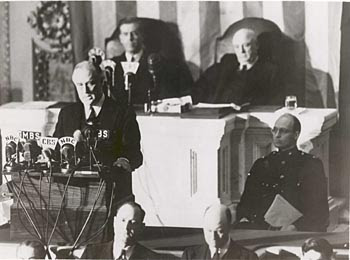"To be nameless in worthy deeds exceeds an infamous history."
Sir Thomas Browne (1605-1682)
Our recent generations have often been defined, unfortunately, by the question: "Where were you when...?" As the generations overlap one another, the questions are always different as are the responses. One thing that is constant is how we are all affected by what Franklin D. Roosevelt coined "a day that will live in infamy" when he referred to the early Sunday morning attack on Pearl Harbor by the military forces of Japan.
 |
| December7, 1941 |
I think of how it affected my parent's generation...the fear, anger, and, sadly the resulting xenophobia against those of Japanese origin. After the initial shock came the call to arms to which the "greatest generation" immediately responded. That same generation had seen, only twelve years earlier, the economic collapse of the great United States followed by years of universal poverty, destitution, and financial ruin. Those two events, among others, shaped a whole generation and tested their fortitude towards going on with daily life...falling in love, getting jobs, raising families, etc.
The question at issue is not only limited to Americans; it is a universal remembrance. The same query could be asked of anyone...an elderly Japanese citizen about when the first nuclear bombs were dropped, my English friends about the Blitz, my Austrian and Dutch relatives about when the Nazis invaded their countries....the list goes on. And for my Black brothers and sisters, the thousands of lynchings in our country such as that of Emmett Till that occurred, at times, almost on a daily basis...each one a day of infamy.
 |
| Emmett Till |
My theory is that we are all defined by history and, as George Santayana so aptly put it, "those who do not remember history are condemned to repeat it". That is why educating our children is so very important to future generations, particularly the veritable facts of our past. Unfortunately, this is not always the case.
These events are, fortunately, not only steeped in infamy but, surprisingly, can offer a glimmer of hope and brighter horizons. I think of the fall of the Berlin wall and what it meant to East Germans, the surrenders of WWII which led us to believe that that was the "war to end all wars", the development of vaccines to assure the greater good for all of us had been addressed, and the Civil Rights Act of 1964 and the day Rosa Parks refused to go to the back of the bus.
 |
| The courageous Rosa Parks |
 |
| The Salk Vaccine trials |
Despite these brighter days, things have not changed all that much and as many of us would say, it's "the same old, same old". As a student of history, my bookshelves are lined with tomes that recollect the human experience, particularly that of the 20th Century.
My own generation (I am, by a sliver, a "pre-Baby Boomer"), is defined, not only by the aforementioned Civil Rights Act but by the assassination of President John F. Kennedy followed in quick succession by that of Rev.Martin Luther King, Robert F. Kennedy, and John Lennon. People took out their anger and frustrations through violent acts. Then there was the terrible fear I felt, a freshman in college, sitting in front of a black and white television watching the Cuban Missile Crisis unfold. This was only "topped" by watching the same TV one year later, watching the funeral procession of the man who had resolved the former event, and witnessing, live as it happened, the murder of his alleged assassin.
 |
| JFK's funeral procession |
 |
| Jack Ruby shooting Lee Harvey Oswald |
After college, I lived abroad and was somewhat removed from the events going on in my native country, seeing them from a different point of view...the race riots, the Viet Nam War protests, and the Kent State massacre (eventually living only a few miles from that day of infamy). My European neighbors would be glued to their TV's and then call me with the message that "America is burning"!
 |
| The Kent State shootings |
I have often found that those from other countries know our own history better than we do. Once, when Barak Obama was running for President, my wife and I were traveling on a train from England to Edinburgh. The train conductor, cockney accent and all, engaged us in a serious discussion on American politics. He was well read and insightful, this coming from an everyday citizen of the UK. Meanwhile, in our own country. street interviews reveal that few people can name the three branches of our government (that includes you, Sen. Tommy Tuberville!!!)
That takes us up to more recent days of infamy, the most infamous of all being 9/11. It was on a beautiful Tuesday morning in September and I was in the office seeing patients, children and their parents. A nurse (who by the way had a fear flying) casually mentioned to me that she heard about a plane crashing into one of the World Trade Center towers. I must admit, I didn't think much of it as other than a navigational error and that it was probably a small private plane. Over the next few moments, events unfolded that made me realize I was terribly mistaken as three more jet airliners crashed into the other tower, the Pentagon, and an isolated field in Shanksville, Pennsylvania. I had to go back into our exam rooms and explain as calmly as I could, with a shaky voice, that America was under attack and, other than for emergencies, we would be closing our office. Infamy, indeed! Now 20 years later, I wonder what our school students are learning from this horrific event.
 |
| Sept.11, 2001 |
This takes me up to our most recent day of infamy, Jan.6, 2021 when a mob attacked the symbol of our democracy, the United States Capitol, based on a big lie, attempting to overturn one of our most sacred acts as citizens, an election. Again, glued to a television, watching the anger and ugliness of the mob, swastikas, Confederate flags, a sea of red MAGA hats and clothing, military-style or with racist slurs that belied (or unveiled) who we really are as a people. One shirt really affected me, colored black with the words "Camp Auschwitz", having had relatives killed by the Nazis.
 |
| The Insurrection of Jan.6, 2021...the attack on our Capitol |
So, twenty years from now, what will we have learned from these latest events (if we're still here as a UNITED country). We've left everything up to our teachers and educational system but, personally, I think we are failing our children. I get it that not everyone is into History. It can be dry and, quite frankly, if not taught in an approachable way, can turn off even the brightest of our students. How do we prevent ourselves from fulfilling Santayana's prophecy? Or Hannah Arendt's "the banality of evil"? or Elie Wiesel's "The opposite of love is not hate, its indifference". There are school districts in America that do not allow students to learn about evolution or read "The Diary of Anne Frank", or, even worse, to learn about the tragic 400 year-old experience of Blacks in America. These are questions that must be answered before we can advance to the stage where we have more days of hope than those of infamy. There's that ancient proverb, "Medice, cura te ipsum" ("Physician, Heal thyself")...the same can be said of our nation.
,

Very thoughtful piece. You and I have lived long enough that we have seen many of these things cycle through more than once. There are days when I fear the only thing we have learned from history is that we don't learn from history. Almost every dumb thing we have seen in response to COVID can be found in the history of 1918-19. And in spite of it all there is some evidence of Dr. King's moral arc of the universe. Robert E Lee is gone from the center of Richmond, Barack Obama was elected president, and there have been many many selfless acts of heroism on and since 9/11. Thanks for the pause for reflection this afternoon.
ReplyDelete